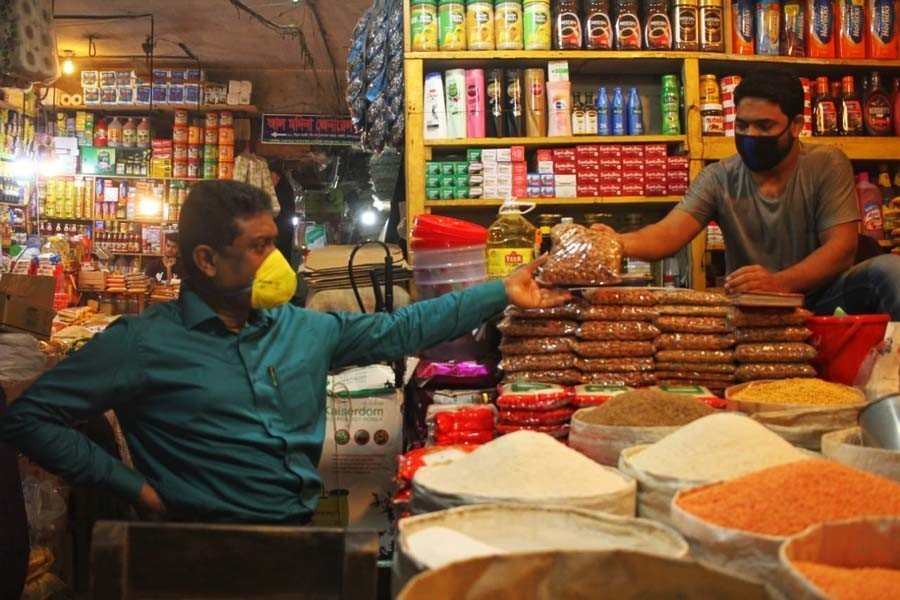That the government is alive to the issue of a possible global food crisis is evident from the statement made by Prime Minister Sheikh Hasina on, at least, a couple of occasions since the outbreak of the Covid-19 pandemic.
On the World Food Day, observed on October 15, the prime minister aired her concern over such a possibility and mentioned the incentives offered by the government, particularly to the peasantry, to help avert any food crisis in the country.
The desperation seen among several food-importing countries to build buffer food stock does indicate a growing sense of fear as far as the availability of food is concerned. Several Asian and African countries have been importing food grains and other essential food items to meet the internal supply shortage and maintain price in the coming months.
The fear of a severe second wave of the viral infection during the upcoming winter has only intensified the race among countries for the import of food grains and other essential items from the international market.
But the food authorities in Bangladesh are least bothered by the developments surrounding the main staple both at home and abroad.
How is the government preparing itself for a possible food crisis in the coming days? Have the people concerned got the prime minister's message right? It does not appear so.
The situation in the food sector, to a notable extent, is messy now.
The prices of rice have soared to a record high despite a bumper production during the immediate past Boro season. The main staple is now costlier than any time in the recent past. Some weeks back, the food ministry fixed the prices of medium and fine varieties of rice, but the millers and traders ignored the same. The food ministry has silently digested the humiliation.
The rice was the first food item that has experienced a steady hike in prices in recent months. Some other food items have followed suit. The reason for the price hike of vegetables is understandable. Four consecutive floods caused damage to vegetables and some other crops. Onion prices made a big jump as neighbouring India imposed a ban on its export. Edible oil has become pricier globally in recent weeks. Bangladesh traders are very prompt in reacting to such a development. However, they tend to be non-reactive in the event of a decline in prices in the international market.
When it comes to the issue of a food crisis, availability and price level of rice are of utmost importance in the case of Bangladesh.
Rice prices are already high. The stock of the item with the millers, traders and individual farm households has always been guesswork.
The government food stock does always play a decisive role in determining the market price of rice in particular. The government's rice stock in recent months has been dwindling fast. The quantity of rice available with the government silos was 8,84,000 tonnes as of October 14 as against 1.34 million tonnes on the same date a year back. The food ministry's failure to meet the procurement target in the last Boro season remains the main reason for the inadequate rice stock.
The consecutive floods between June and September this year have marred the prospect of a better Aman production. Moreover, the Aman harvest is, at least, a couple of months away.
Under the circumstances, the food ministry should have seriously considered the import of rice in both private and public sectors. Virtually, there has not been any import of rice during the last fifteen and a half months. Fortunately, parboiled rice price exported by India is less than US$400 a tonne now. However, the same coming from Thailand is quite expensive -- US$525.
The food ministry should devote itself to a major exercise involving the supply and prices of rice, a politically sensitive food item in this part of the world. Without sufficient food stock, the government would find it hard to intervene in the market to stabilise rice prices or offer relief to the needy in the event of a so-called 'second wave' during the upcoming winter.
In 2017, the rice prices made a sudden jump, giving rise to lots of noises. But that was an altogether different situation. The poor and low-income people were unhappy about the price-rise as they had to spend a substantial part of their day's income on rice purchase. Yet they could manage it with their earnings.
The time is not the same now. Quite a large percentage of poor and low-income people -- lower-middle-class included -- are finding it hard to make a living these days. The pandemic has sapped their financial strength. Some people have restarted their lives, but not the way those were during the pre-Covid days. So, the hike in prices of essentials, including rice, is hurting them seriously. If the prices go on rising, their sufferings would only multiply.
The prime minister has referred to loan stimulus package for farmers. But the progress in its disbursement is also not at all satisfactory.
The Bangladesh Bank on April 14 last announced a stimulus loan package worth Tk 50 billion for the agriculture sector. But, during the first three months since that announcement, banks could disburse only Tk 3.8 billion. The central bank asked banks to distribute the rest amount by August, but that target remained unmet.
So, the preparedness at the field level does not match the alertness noticed at the highest level of the government concerning the food situation.


